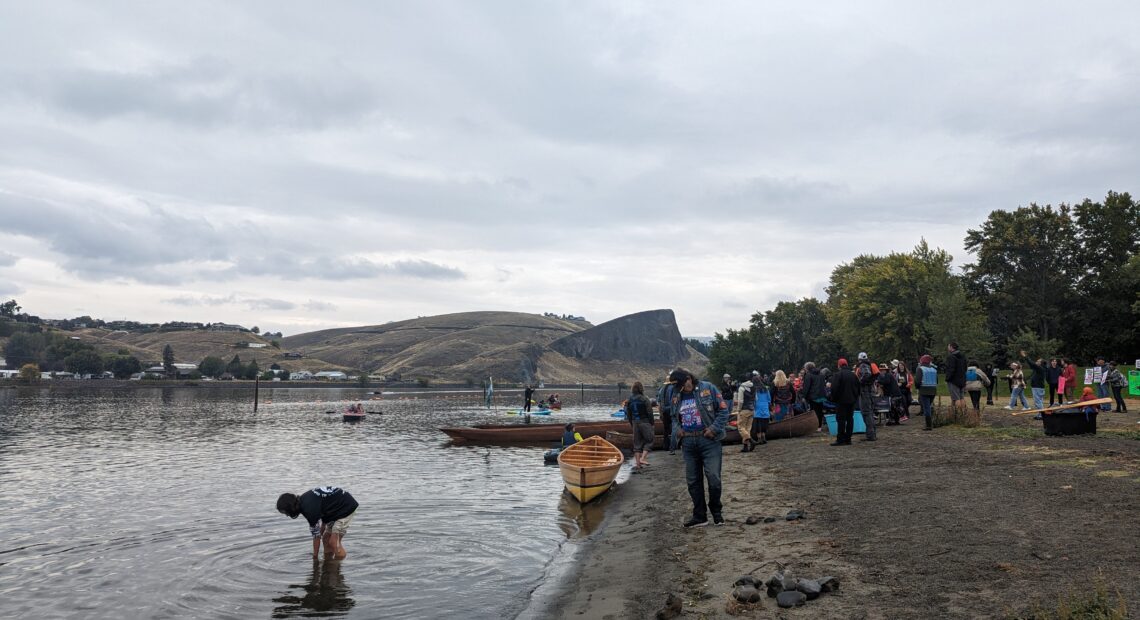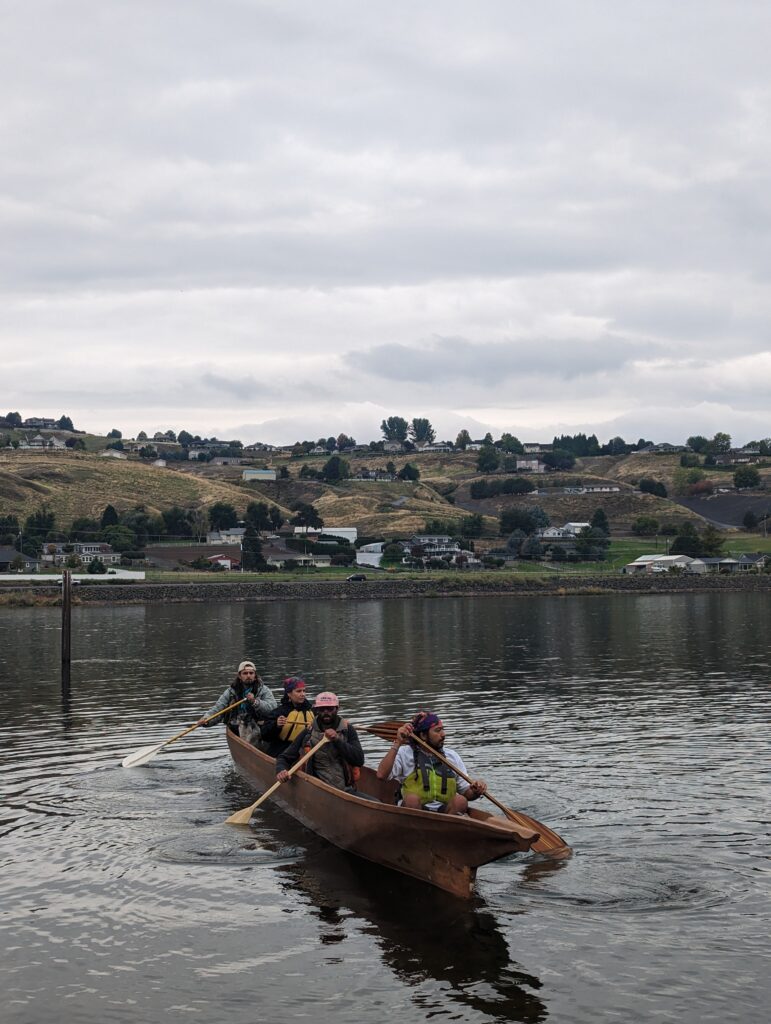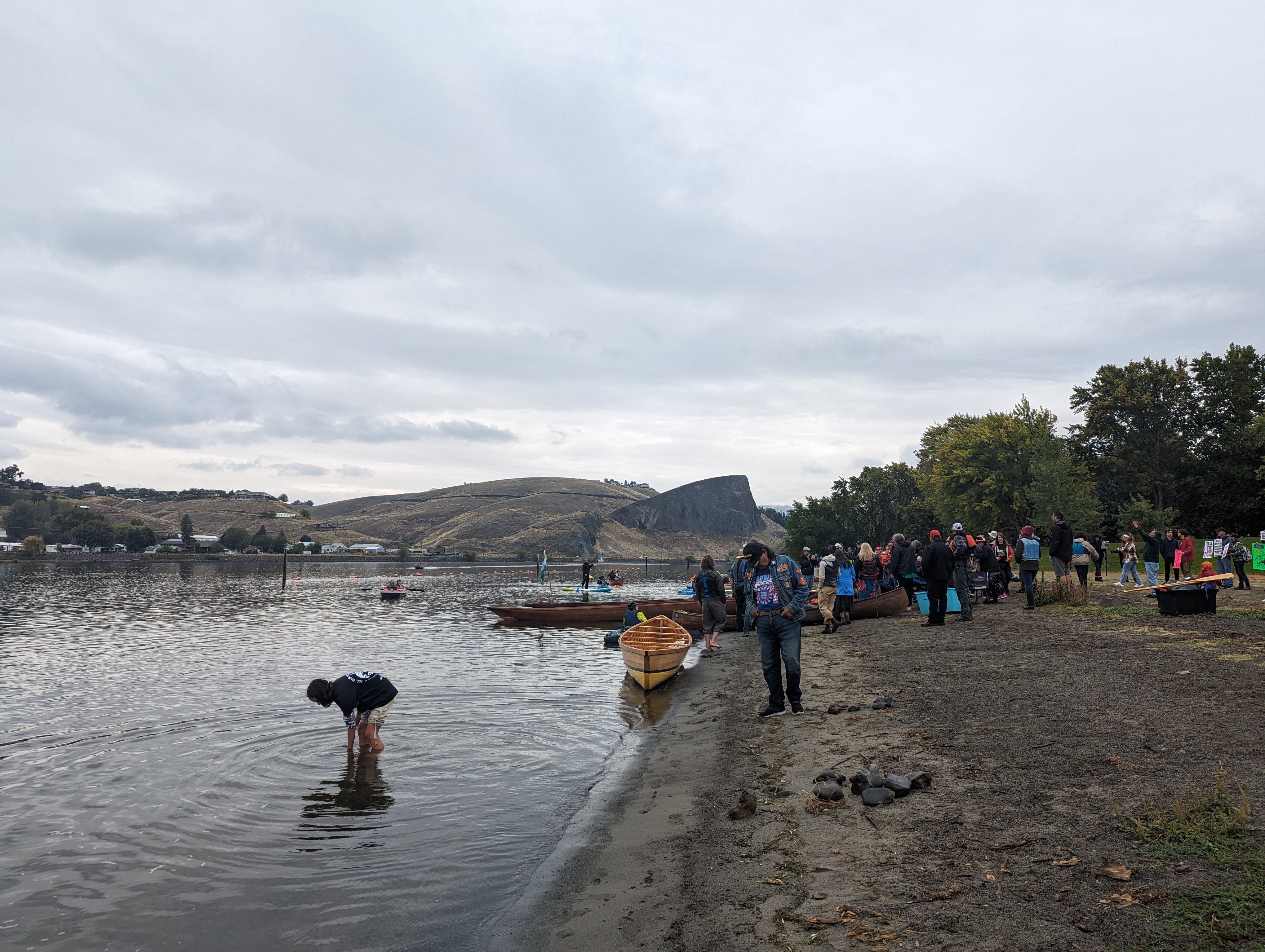
As Biden negotiates future of lower Snake River dams, Northwest tribes push for removal
Listen
(Runtime 3:20)
Read
Indigenous and non-Native people gathered for the All Our Relations Snake River Campaign event in early October along the banks of the Hells Gate State Park in Lewiston, Idaho to show support for removing four lower Snake River dams.
Proponents of dam removal say it’s the only way to save the salmon. Opponents say the dams are still used for energy and agriculture.
“We’re here because the Biden administration needs to understand. This is a majority opinion: breach those dams, save the salmon and restore our relationship with the Snake River. That’s what we want the Biden administration to do,” said Judith LeBlanc, executive director of the Native Organizers Alliance and a citizen of Caddo Nation. The organization serves as a national network, mobilizing Indigenous people around political issues.

Canoe paddlers making their way down the Snake River in a hand-carved wooden canoe on September 30, 2023. (Credit: Lauren Paterson / NWPB)
Native American voters have been a consequential electoral group for multiple political races in 2020, including president Biden’s victory in Wisconsin and Arizona, according to the Brookings Institute.
“In seven of the battleground states, we did help determine the outcome of 77 electoral votes,” said LeBlanc. “We turned out in historic numbers, making it possible for our communities to be a part of defeating Trump.”
Dam removal campaigns led by Northwest Tribes were held in Olympia, Portland, Pasco, Spokane, Lewiston and Seattle.
The Biden administration is currently in negotiations regarding the dams, said LeBlanc.
“I think the beauty of All Our Relations tour along the Snake River is that it’s brought together conservationists, environmentalists and Native communities and tribal leaders, because we’re all speaking in one voice because we have the same concerns,” said Judith LeBlanc.
Tribal elders gave speeches on the banks of the Snake River just outside of Lewiston. Tribal and non-tribal event attendees rode the water in hand-carved wooden canoes. A free lunch of salmon, frybread and elk and bison stew was served to visitors.

Cousins Wayne Wakwak and Nicole Bashaw serve elk and bison stew at the All Our Relations campaign event on September 30, 2023. (Credit: Lauren Paterson / NWPB)
“In this area we have the largest steelhead in the world, other than Alaska,” said Robbin Johnston, a retired anthropologist and historian for the Nez Perce Clearwater National Forest.
“In the 1855 treaty, the agreement was that the Nez Perce could hunt and fish on unclaimed lands, like the national forests,” said Johnston. “That means they were supposed to be able to fish here.”
Members of the Nez Perce Tribe have the right to hunt and fish on all public lands. even outside the boundaries of the reservation.
After the tribe gave up millions of acres, having access to salmon was part of the deal. “But the dams broke the treaty,” said Johnston, explaining that dams prevent the Nez Perce from accessing the fish they were promised as a legal right.

Locally-sourced salmon and fry bread made on site was served to visitors. (Credit: Lauren Paterson / NWPB)
The Nez Perce Tribe — along with the Confederated Tribes and Bands of the Yakama Indian Nation, the Confederated Tribes of the Warm Springs Reservation of Oregon and the Confederated Tribes of the Umatilla Indian Reservation – have treaties with the United States government.
“Actions since 1855, including the Federal Government’s construction and operation of dams, private dam building, population growth and overfishing, have changed the ecosystem and severely depleted wild fish populations in the region, substantially harming the tribes’ ability to exercise their rights reserved under treaty to hunt and fish in all usual and accustomed places,” reads a fact sheet published by the Biden Administration on September 27. “Since the dams were constructed, 13 fish species have been listed as threatened or endangered.”
One or more of the Snake River dams must be breached to recover healthy salmon populations, according to a federal report released in July. Federal officials from the Bonneville Power Administration commissioned an independent analysis from consulting firm E3 to find ways to offset electricity generated from the four dams.
House Representative Dan Newhouse (R-WA) released a statement last week after Biden published a memorandum on restoring native fish populations to the Columbia Basin. Rep. Newhouse says the dams are vital to the economy, efforts to reduce carbon emissions and sending products overseas. “The Columbia River Basin is one of our most valuable natural resources in the Pacific Northwest and I will continue to fight each and every day against this Administration’s efforts to breach these vital dams,” said Newhouse.
There are multiple solutions for how to overcome the concerns about removing the dams, says LeBlanc.
“Electricity, we can generate in many different ways. Other transportation hubs can be established for transporting goods and agribusiness has to adjust itself as well,” said LeBlanc. “If we keep our eyes on the horizon of what the ultimate goal is. It’s to have a healthy, thriving Snake River that’s going to attract even more tourists and it’s going to attract people who want to care for this area, this beautiful area of the Nez Perce.”
An update on the court case involving the dams is expected at the end of October.
















